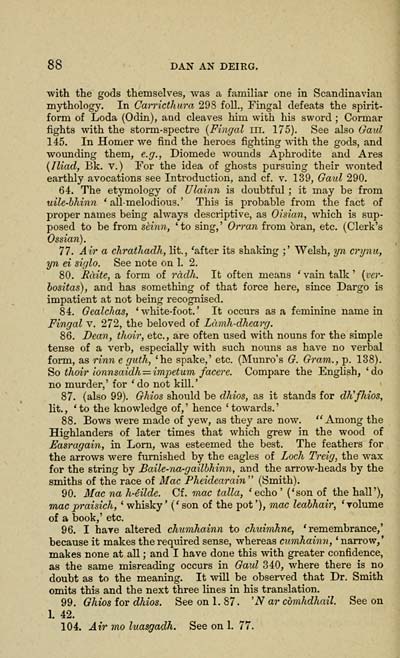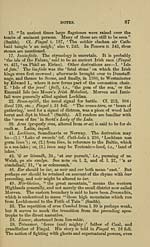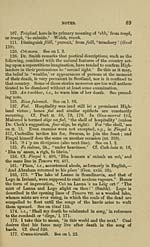Download files
Complete book:
Individual page:
Thumbnail gallery: Grid view | List view

88 DAN AN DEIRG.
■with the gods themselves, was a familiar one in Scandinavian
mythology. In Carricthura 298 foll., Fingal defeats the spirit-
form of Loda (Odin), and cleaves him with his sword ; Cormar
fights with the storm-spectre {Fingal ili. 175). See also Oaul
145. In Homer we find the heroes fìghting Mdth the gods, and
wounding them, e.g., Diomede wounds Aphrodite and Ares
{Iliad, Bk. V.) Yov the idea of ghosts pursuing their wonted
earthly avocations see Introduction, and cf. v. 139, Gaul 290.
64. The etymology of Ulainn is doubtful ; it may be from
uile-hhinn * all-melodious.' This is probable from the fact of
proper names being always descriptive, as Oisian, which is sup-
posed to be from sèinn, 'to sing,' Orran from òran, etc. (Clerk's
Ossian).
77. Air a chrathadh, lit., 'after its shaking ;' Welsh, yn crynu,
yn ei siglo. See note on 1. 2.
80. Ràite, a form of ràdh. It often means ' vain talk ' {ver-
hositas), and has something of that force here, since Dargo is
impatient at not being recognised.
84. Oealchas, ' white-foot. ' It occurs as a feminìne name in
Fingal v. 272, the beloved of Làmh-dhearg.
86. Dean, thoir, etc, are often used with nouns for the simple
tense of a verb, especially with such nouns as have no verbal
form, as rinn e guth, 'he spake,' etc. (Munro's O. Oram., p. 138).
So thoir ionnsaidh = impetum facere. Compare the EngUsh, 'do
no miu'der,' for 'do not kill.'
87. (also 99). Ohios should be dhios, as it stands for dh'fhios,
lit. , ' to the knowledge of , ' hence ' towards. '
88. Bows were made of yew, as they are now. " Among the
Highlanders of later times that which grew in the wood of
Easragain, in Lorn, was esteemed the best. The feathers for
the arrows were fumished by the eagles of Loch Treig, the wax
for the string by Baile-na-gailbhinn, and the arrow-heads by the
smiths of the race of Mac Pheidearain" (Smith).
90. Mac na h-èilde. Cf. mac talla, 'echo' ('son of the hall'),
mac praisich, ' whisky ' (* son of the pot '), mac leabhair, 'yolume
of a book,' etc.
96. I hare altered chumhainn to chuimhne, 'remembrance,'
because it makes therequired sense, whereas cumhainn, 'narrow,*
makes none at all ; and I have done this with greater confidence,
as the same misreading occurs in Oaid 340, where there is no
doubt as to the meaning. It will be observed that Dr. Smith
omits this and the next three lines in his translation.
99. Ghios ioT dhios. Seeonl.87. ' N ar còmhdhail. See on
1. 42.
104. Air mo luasgadh. See on 1. 77.
■with the gods themselves, was a familiar one in Scandinavian
mythology. In Carricthura 298 foll., Fingal defeats the spirit-
form of Loda (Odin), and cleaves him with his sword ; Cormar
fights with the storm-spectre {Fingal ili. 175). See also Oaul
145. In Homer we find the heroes fìghting Mdth the gods, and
wounding them, e.g., Diomede wounds Aphrodite and Ares
{Iliad, Bk. V.) Yov the idea of ghosts pursuing their wonted
earthly avocations see Introduction, and cf. v. 139, Gaul 290.
64. The etymology of Ulainn is doubtful ; it may be from
uile-hhinn * all-melodious.' This is probable from the fact of
proper names being always descriptive, as Oisian, which is sup-
posed to be from sèinn, 'to sing,' Orran from òran, etc. (Clerk's
Ossian).
77. Air a chrathadh, lit., 'after its shaking ;' Welsh, yn crynu,
yn ei siglo. See note on 1. 2.
80. Ràite, a form of ràdh. It often means ' vain talk ' {ver-
hositas), and has something of that force here, since Dargo is
impatient at not being recognised.
84. Oealchas, ' white-foot. ' It occurs as a feminìne name in
Fingal v. 272, the beloved of Làmh-dhearg.
86. Dean, thoir, etc, are often used with nouns for the simple
tense of a verb, especially with such nouns as have no verbal
form, as rinn e guth, 'he spake,' etc. (Munro's O. Oram., p. 138).
So thoir ionnsaidh = impetum facere. Compare the EngUsh, 'do
no miu'der,' for 'do not kill.'
87. (also 99). Ohios should be dhios, as it stands for dh'fhios,
lit. , ' to the knowledge of , ' hence ' towards. '
88. Bows were made of yew, as they are now. " Among the
Highlanders of later times that which grew in the wood of
Easragain, in Lorn, was esteemed the best. The feathers for
the arrows were fumished by the eagles of Loch Treig, the wax
for the string by Baile-na-gailbhinn, and the arrow-heads by the
smiths of the race of Mac Pheidearain" (Smith).
90. Mac na h-èilde. Cf. mac talla, 'echo' ('son of the hall'),
mac praisich, ' whisky ' (* son of the pot '), mac leabhair, 'yolume
of a book,' etc.
96. I hare altered chumhainn to chuimhne, 'remembrance,'
because it makes therequired sense, whereas cumhainn, 'narrow,*
makes none at all ; and I have done this with greater confidence,
as the same misreading occurs in Oaid 340, where there is no
doubt as to the meaning. It will be observed that Dr. Smith
omits this and the next three lines in his translation.
99. Ghios ioT dhios. Seeonl.87. ' N ar còmhdhail. See on
1. 42.
104. Air mo luasgadh. See on 1. 77.
Set display mode to: Large image | Transcription
Images and transcriptions on this page, including medium image downloads, may be used under the Creative Commons Attribution 4.0 International Licence unless otherwise stated. ![]()
| Early Gaelic Book Collections > J. F. Campbell Collection > Dàn an Deirg agus Tiomna Ghuill (Dargo and Gaul) > (124) |
|---|
| Permanent URL | https://digital.nls.uk/77289022 |
|---|
| Description | Volumes from a collection of 610 books rich in Highland folklore, Ossianic literature and other Celtic subjects. Many of the books annotated by John Francis Campbell of Islay, who assembled the collection. |
|---|
| Description | Selected items from five 'Special and Named Printed Collections'. Includes books in Gaelic and other Celtic languages, works about the Gaels, their languages, literature, culture and history. |
|---|

